Abdul Ghafar Stanikzai: Afghanistan war crimes investigator is now Captain Cricket
Kenilworth Cricket Club players welcomed Abdul with open arms. But they could never have known the horrors he had witnessed and investigated in war-torn Afghanistan.
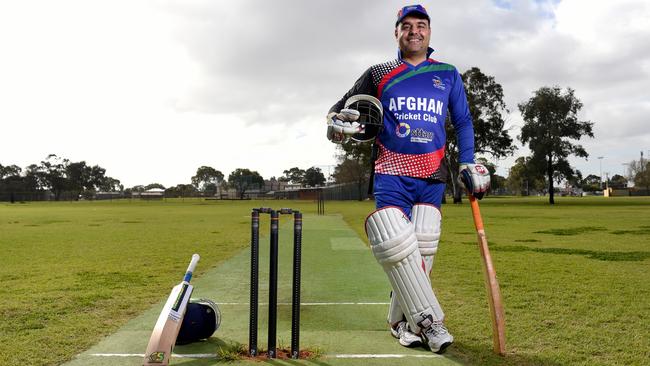
SA Weekend
Don't miss out on the headlines from SA Weekend. Followed categories will be added to My News.
- The Adelaide scientist determined to stop COVID
- Wildlife wars: Avoiding the next pandemic
- Feeling smart today? Take the Brainwaves quiz
After an afternoon tea of traditional Afghan biscuits washed down with gallons of green tea, Abdul Ghafar Stanikzai rises from the cushions lining the walls of his guests’ parlour, pops a pistachio in his mouth, offers his hand and smilingly declares: “We are villagers now.”
“I am from a village in Afghanistan but Adelaide is my new village, and it is also your village, so we are villagers now,” he says.
Adelaide has been his village for almost six years now. Two of his three sons were born here. While we talk, the boys play soccer in the courtyard below, their laughs punctuated by the ball thwacking into walls and other hard objects. They’re obsessed with soccer, his three boys. Dad prefers cricket. And it was cricket that unlocked his new life in a foreign land.
Feeling disconnected after arriving in Adelaide as a refugee of Australia’s longest and most recent war, Stanikzai knew he had to break out, to meet people and make a go of his new life.
After a cursory trawl of the net, he cold-called Kenilworth Cricket Club and trepidatiously attended a practice session at the club’s ramshackle South Parklands nets. To his surprise and delight, he was asked to play that Saturday.
“I didn’t know any Afghans here,” he says. “I was not trying to find cricket. I was trying to find any sport to keep me busy and make friends.”
Stanikzai nestled into his new club like a bail in a wicket. The Kenilworth players warmly welcomed Abdul the Afghani Leg-Spinner. Although Abdul the Afghani Leg-Spinner had a secret. Myriad secrets.
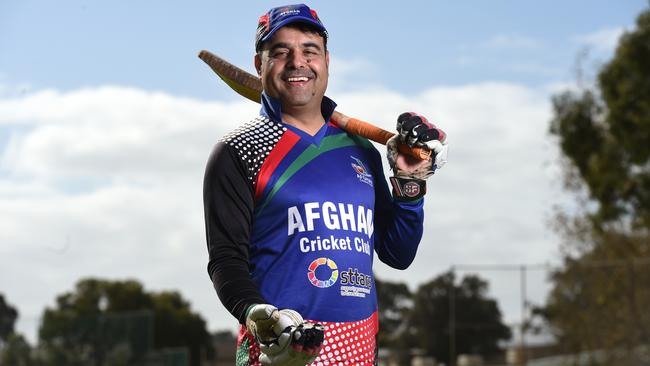
For Stanikzai was a medical doctor who was a war crimes investigator in Afghanistan. His past was happened upon by teammate David Denborough who, as a director of the Dulwich Centre, a community support and counselling organisation, heard of Stanikzai’s background through mutual acquaintances in Afghanistan.
“This guy bowling in the nets who no-one knows anything about, I realised he was a doctor and a human rights advocate,” Denborough says.
“He was really struggling at that time, making a new life in his new country. He reached out through cricket.”
Cricketers need nicknames and Denborough decided Abdul the Afghani Leg-Spinner would henceforth be called Doctor Cricket.
Soon, other Afghans turned up at Kenilworth. So many that the club formed another side. Denborough and club president John Gritzalis played in a team otherwise entirely made up of Afghans, including men who had served as combat interpreters with the Australians in Afghanistan.
“We formed another team from Doctor Cricket and his network,” Denborough says. “It was me, Johnny and nine Afghans. It was fantastic.
“Sometimes they didn’t have any cricket gear. They had one car to pick them all up on a Saturday. We became firm friends and I enjoyed some of the best cricket I’ve ever had because of their exuberance and love of the game.
“It’s an example of how sport, in this case cricket, can bring people together.”
Stanikzai’s story is one of strangers clasping and melding to forge a new community spirit. It’s a story of how a man and his family have found new life after narrowly escaping death.
Stanikzai had a choice: flee Afghanistan or die. His work as a human rights investigator drew the Taliban’s attention.
Sensing the danger, he confronted the threat head on. He arranged to meet a local official with shadowy Taliban connections, who asked him: “Why do you give information to the Australians?”
That was the moment Stanikzai knew he was a marked man.
TEARS OF JOY
Stanikzai sought, and was granted, asylum. After he left Afghanistan, a former colleague heard a knock on the door, answered it and was shot on his doorstep. Another co-worker, a woman, was also murdered.
There was an irony in the Taliban painting a target on his forehead. Because many of Stanikzai’s independent investigations centred on the actions of the Taliban’s sworn enemies: the Afghan army and foreign forces. Including Australian foreign forces.
He was appointed by the Afghan Independent Human Rights Commission to investigate the alleged murder of an Afghan civilian by the Australian Special Air Service Regiment (SAS) in 2012. Stanikzai’s investigation found several inconsistencies and irregularities, which he reported to the Australian authorities, who commissioned a military inquiry that found the SAS had acted lawfully.
The incident had a sequel in June, when former SAS medic Dusty Miller emerged to say he dressed the Afghan man’s wounds before he was taken away and allegedly executed by another Australian or Australians. Miller tracked down the slain man’s sons and apologised to them in a tearful Skype hook-up between Australia and Afghanistan.
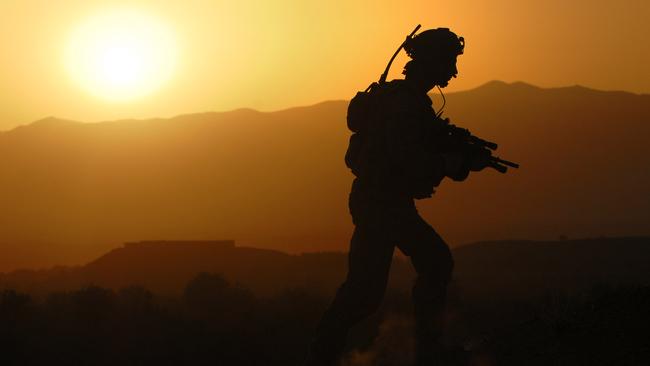
“You could see the tears of the sons,” Stanikzai says. “Those tears were not of anger. Those tears were not of sadness. Those tears were of joy.”
The sons cried for Miller and his angst as much as they did for their dead father. They knew one of the Australian soldiers had cared for their father, because they had found a bandage on his corpse. Now they had spoken to that man and had received his apology. Miller had solved that small part of the mystery of their father’s death. And the sons were grateful.
Stanikzai is also grateful. He is grateful for the Australian soldiers testifying to the Brereton inquiry into alleged special forces war crimes in Afghanistan. Judge Paul Brereton’s report is close to being finalised and released.
“Doctor Cricket knows what a significant thing that is for Afghanis,” Denborough says. “Doctor Cricket knows what a difference that makes. That these things haven’t been forgotten.
“It’s very moving for me to realise that these Australian military folk are speaking out … what they’re doing is really contributing something.”
Stanikzai has contacted whistleblowers such as Miller to thank them for their courage in speaking out. But he proffers forgiveness, not retribution.
So his planned next project is typical of the man. He wants to connect Afghan expats – including translators who worked with diggers on the battlefields – with veterans and the families of Australia’s Afghanistan war dead.
The plan is to link with villages in Afghanistan, just as Australian towns twinned with French communities after World War I, and vice versa.
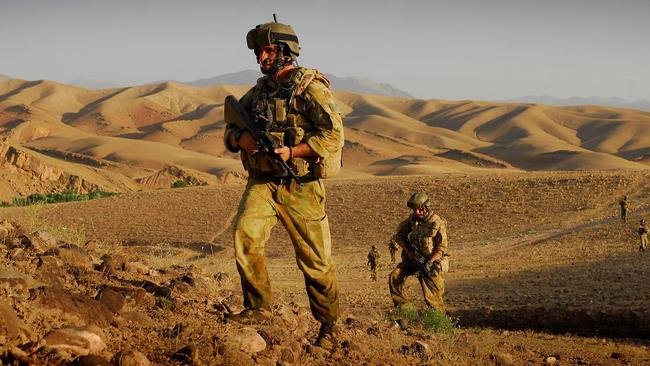
Stanikzai wants bereaved families to know that Afghans haven’t forgotten the Australians who came from the other side of the world to fight the Taliban and terrorism.
“Your life was damaged by the war,” he says. “We have not forgotten you. We are committed to contributing something back to these people. It will be something for the (Australian) families. (And) it will mean a lot to these Afghan villages.”
The Afghan goodwill stems in part from Australia’s good works. Good works such as the schools, hospitals, health clinics, bridges and roads built by the Australian Defence Force during its 13-year deployment.
“These are things that people still remember,” Stanikzai says.
He wants to fund new projects under the names of the soldiers who died in Afghanistan. That will help the Afghan villagers and hopefully assuage Australian grief.
Stanikzai likes Australians – his fellow Australians, now he’s one of us. His Afghan Independent Human Rights Commission office in Tarin Kowt was a few hundred metres from the Australian task force base. He made friends with Australian soldiers and diplomatic staff.
“Australia has a very good image and a very good name,” Stanikzai says when asked why he sought asylum in Australia and not the US, nor anywhere else on the globe. And he chose Adelaide as his home. He ruled out Melbourne – too big and the pockets of Afghan expats were too far from the CBD.
He, wife Zahra and their three boys live in a northwestern suburbs home furnished in Afghan style: plush rugs, minimal furniture and Koran verses etched in silver hanging on the wall. Asked his age, Stanikzai smiles and says “39”. The smile is because few Afghans celebrate birthdays. “In Afghanistan the age is not that much important,” he says. They mark their age by which president was in power at the time.
CRICKET SHOWED THE WAY
The Stanikzais are making their way in a foreign land but it’s not easy. A medical doctor with a degree from Kandahar University, Stanikzai wants to work as a GP but registering as a doctor in Australia is an involved and costly process – it’s $3000 to sit the exam.
When he arrived in December 2014, he didn’t know how to apply for registration. Stanikzai didn’t know anyone. He and his family were alone. Two years later he applied but failed the stringent registration tests. He was midway through a second attempt when COVID-19 struck, shutting the offices of the Australian Health Practitioner Regulation Agency.
“I just want to do something for the community and for my family,” Stanikzai says. “I’m trying to do my part and I’m still hopeful something will happen.”
In the meantime, now he’s a not-so-new Australian, he’s helping refugees and migrants make friends and contacts in their new homeland. Working for refugee support organisations, he interviews and helps new arrivals. Lately he’s been gathering data on acute pain in Afghani and Pakistani migrants, including many who’ve been injured in war. It’s hard to imagine a better person for the job: an ex-battlefield investigator and Afghan doctor who speaks five languages (six if you count Persian – he’s working on it).
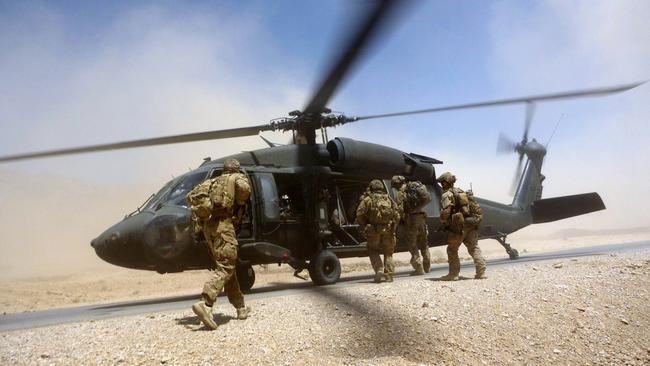
And Stanikzai well knows what it’s like to be alone in a new country. “When I came here I came with the intention to have a new life. In the beginning it seems like it’s very good. Then after a while I got a little bit stressed and depressed. I had to look for work or further education for the future. And there was no one around to guide me.”
Until cricket showed the way. After a few seasons at Kenilworth the numbers of Afghan players were such that Doctor Cricket branched out to form the Afghan Cricket Club. Under his leadership – he’s the skipper – and from its temporary home ground at Victoria Park, the club acts as a beachhead for new arrivals. When families arrive they tap into the Afghan community through the cricket club.
“The cricket club is helping people make friends and contacts,” Stanikzai says.
Cricket will likely play a part in his mission to strengthen the links between Afghanistan and Australia.
“Really that’s all come about from Abdul Ghafar turning up at the Kenilworth Cricket Club nets,” Denborough says. “To him saying, ‘I’ve really got to take the next step to making a new life in Australia’.
“He thought he’d have to leave all his human rights work behind when he came here. But as it turns out, his good work is continuing here in Australia.
“It’s a significant story. He’s a great guy. And he represents a story of Afghanistan that we don’t see.”

